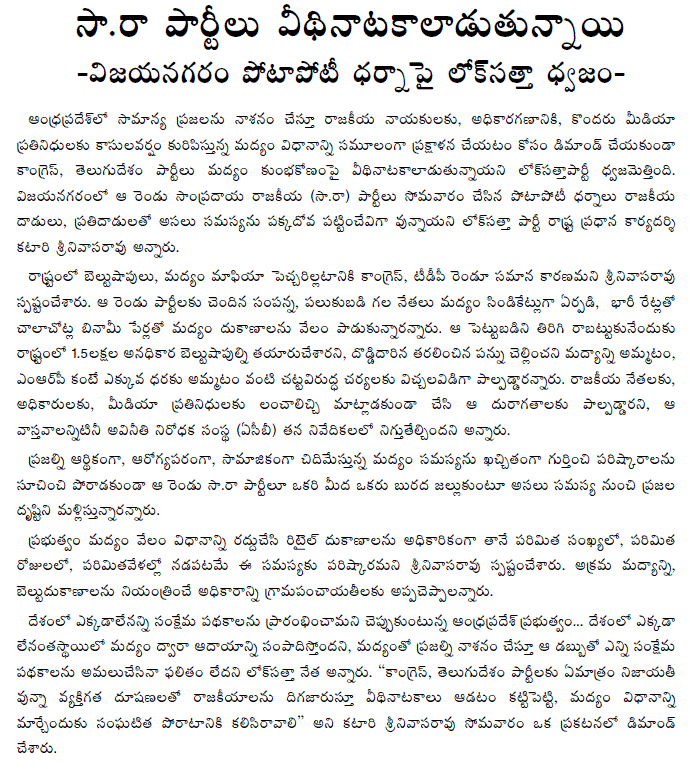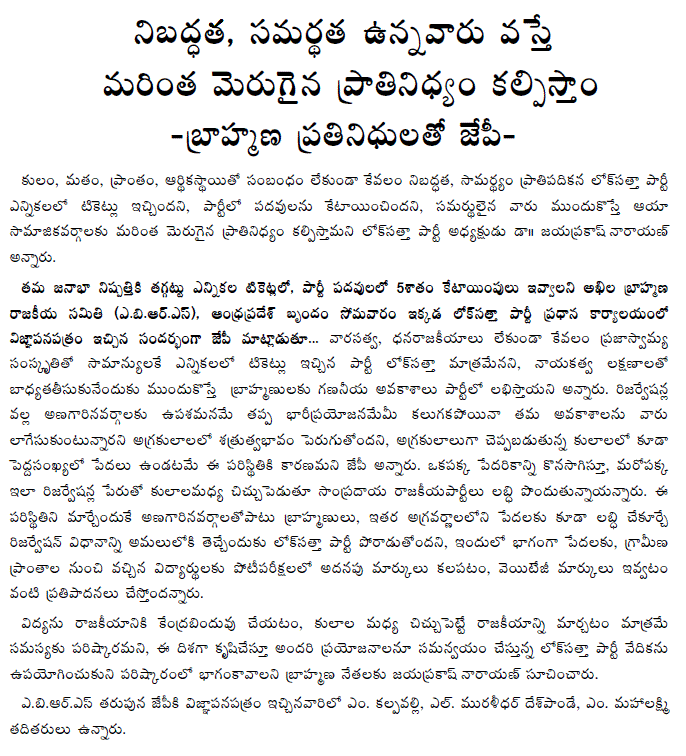Dr.JP's Letter to the Prime Minister on Liberating Agriculture
26th April, 2012
To,
Dr Manmohan Singh
Prime Minister of India
South Block, Raisina Hill
New Delhi – 110 001
Esteemed Prime Minister Dr Manmohan Singh ji,
Sub: Comprehensive strategy to make agriculture the engine of economic growth – Reg.
I am writing this somewhat long letter to seek your urgent and personal intervention to address the challenges facing Indian agriculture. In recent years, the farm sector is going through severe crisis. While input and labour costs have gone up significantly, prices of agricultural commodities at the farm gate have fallen. The food inflation we have witnessed an year ago was largely on account of perishable commodities like eggs, milk, meat, fruits and vegetables. Because of poor supply chain, inadequate storage and transport, and failure to process surplus commodities, there is enormous volatility in perishable commodities, especially vegetables. As a result small farmers and tenants are suffering fall in incomes.
This crisis is deepened by inconsistent and ad hoc government policies. The rest of the economy has largely been liberated from the clutches of license-permit-control-quota raj, thanks largely due to your stewardship of the economy in the crisis years of 1991-96. However, agriculture is still subject to arbitrary and unjustified controls. The input controls (fertilizer) are given up, albeit slowly, leading to rise in fertilizer prices. But output is subjected to severe controls, depressing prices.
Record volume of food grains are stored in the central pool. Half the grain is kept in open plinths covered with tarpaulin for want of storage capacity. In many states, even the food grains distributed in PDS are ‘recycled’, with PDS stock resold to traders, and in turn bought by FCI as ‘levy’. The arbitrage opportunities are making some unscrupulous traders rich at the cost of public exchequer. India has long-term surplus of food grains. Production is showing a secular, long-term growth, and percapita consumption is falling on account of shift to fruits, vegetables, eggs, milk and meat. And yet we have ad hoc policies on exports. For years, grain exports have been banned even as our grain stock is rotting. Thanks to your intervention, in late 2011, rice exports have been allowed. However quotas are imposed and ad hoc policies are pursued. Because of uncertainty and ad hocism, Indian rice is selling at less price than comparable Thai rice. Every other week there is threat of arbitrary export quotas and reversal of decisions, and consequently exporters cannot take risks or establish long-term market linkages. In some states like Andhra Pradesh, illegally, food grain sales across the state border are banned, causing further distress to farmers.
Cotton prices have been fluctuating wildly on account of ad hocism in policy. The current price for farmer is below ` 4000 per quintal. There is record production. But cotton farmers are in distress because even in a good year, they are not able to generate surpluses. You may recall that the largest number of farm suicides over the years have been by distressed cotton farmers. And yet, the government unabashedly pursues a policy calculated to depress prices, and imposes quotas and stops exports at will on the ground that Indian textile industry needs raw material. Farmers would be glad to sell to anybody – Indian or foreign – if the price is good. If there is a shortage in India, let there be a price signal to that effect, instead of reemergence of control-permit raj. We cannot ask the already crisis-ridden farm sector to forcibly sell at low prices to enhance the profits of a few in industry. If farmers switch over to other crops on account of low prices of cotton, there will be a long-term shortage and price increase, adversely affecting the economy. It is shocking that our ad hoc farm export policies are completely ignoring the fundamental laws of economics governing demand, supply and price. We are bringing back the discredited control-permit-quota raj into agriculture. This is causing distress to the farmer, and will undermine our economy in the medium and long term.
India is the biggest importer of edible oil. There is a need to boost oil seed production, even as we import to overcome shortages. The world over, moderate import duties are levied on farm imports, and incentives are given to boost indigenous production. Surprisingly, India does not subject edible oil to any import duty. On occasion, sensing India’s dependence on imports, the exporting countries are levying export duty! If a moderate duty of, say 10%, is imposed on edible oil imports, and if that revenue is ploughed back to oil seed farmers as incentive to boost production, within a few years we will not have shortages. Time and again, when technology and price incentives are available, the poor, illiterate Indian small farmers have achieved great results. And yet, ad hoc policies are now making India forever dependent on imports in the vital edible oil sector. Both the Indian farmer, and the economy are losing out.
I have outlined the impact of ad hocism and antediluvian policies on three commodities – food grains, cotton and edible oils – to highlight the failure of government policies in protecting the farmer through proper price signals. This failure is leading to long-term dangers to the economy. Depressed prices will force more and more farmers to leave farming (already crop holidays are being declared in Andhra Pradesh), or farmers will move rapidly from crop to crop in the quest for better incomes leading to volatility in prices. Long-term shortages because of failure of price signal, and agrarian distress are real and mounting dangers to the economy.
The government needs to act swiftly and wisely before the crisis leads to massive rural unrest. I earnestly urge you to take the following initiatives to address the farm crisis:
- Trade in agricultural commodities should be fully and irrevocably liberalized so that farmers get the best prices that markets can offer, and the price signal will boost long-term production.
- Needs of Indian industry and consumer will be met by better price signal, not by depressing the farmers’ price, thus leading to medium and long-term shortages and price-rise.
- Massive investments and technology should be brought into storage, supply chain and agro-processing.
- A moderate import tariff should be levied on agricultural imports, especially edible oil, and that income should be deployed as incentives to boost production, and end shortages.
- Simultaneously, the Munimum Support Price (MSP) should be continued for some time to act as a safety net to farmers until economic freedom yields satisfactory results.
- A comprehensive policy should be evolved to leverage our strengths in agriculture (11% of world’s agricultural land, sunshine, good rain fall, and strong agrarian tradition), and make it an engine of growth and an earner of export revenue, not a drag on the economy.
It is time that the challenges and opportunities of agricultural sector are addressed in a comprehensive manner – not in silos of agriculture, food and commerce ministries. Your oft-repeated call for the second green revolution can be realized if we make a fundamental break from ad hocism and failed policies, and view the prosperity of the farmer and consumer as an inseparable, harmonious goal.
You are a great economist with deep insights into agriculture and needs of Indian economy. Your leadership and sagacity have helped us convert the economic crisis of 1991 into an opportunity for growth and prosperity. Crisis-ridden Indian agriculture today needs your leadership to overcome the challenges, and become an engine of growth and reliable supplier of food to our population and raw materials to our industry.
With warm personal regards,
Yours truly,
Jayaprakash Narayan
President, Lok Satta Party


